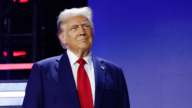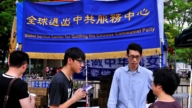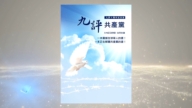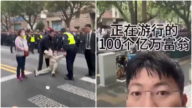【新唐人2011年12月19日讯】美国驻华大使骆家辉,日前接连批评中国人权恶化以及对外资开放程度不够。受到中国民间热捧的这位华裔亲民大使,在炮轰中共当局的时候毫不嘴软,令中共官方感到尴尬和不快。
美国驻中国大使骆家辉14号接受“美联社”专访时,再度抨击中国的人权状况。他表示,美中关系越深化,美方就会越关切中国的人权状况。过去一年中国发生的侵犯人权问题越来越多。
骆家辉说,中国人权变得更加糟糕,令他们感到极为担忧。骆家辉表示,受到国际上“茉莉花革命”的影响,过去一年中国人权问题恶化,对异议人士、维权律师的拘留、拘捕情况非常普遍。
在此之前,骆家辉在10号的“国际人权日”当天发表声明,批评中国人权状况,前任驻美大使洪博培也曾有过类似批评。但中共外交部再次搬出:“中方坚决反对美国藉人权问题干涉中国内政”的辞令,来反驳。
中国艺术研究院学者吴祚来表示,人权是全人类的事情,各个国家互相关心人权状况是正常的。
吴祚来:“胡锦涛,温家宝,习近平都说中美关系非常重要,中美关系会影响整个世界,但是在很多人那里,我也不知道是哪些人,或者在网络上看到很多人反对美国,似乎美国在向中国灌输普世价值,似乎美国关心人权是干预中国内政。”
骆家辉15号应邀出席一场财经论坛时发表演说,骆家辉说“美国对来自于中国的投资限制非常少”,相对来说,中国市场却不开放,他说,中美经济合作最大障碍之一就是中国在很多领域还是缺乏开放、透明,他对中国﹙中共﹚政府在过去几年变本加厉的干预,感到忧虑。骆家辉以保险业为例,表示:外国保险公司的专业理念领先中国,但外国保险业受到限制,只能以合资方式来中国发展。
北京宪政学者陈永苗认为,国际上对于中国加入世贸之后,对外会大规模开放的热切期待现在落空了。中国经济的走向还是受制于权力本身或者专制本身。
陈永苗:“到了今天来看,他所谓的市场经济还是非常不符合市场经济的定义本身,还是非常像在权力控制之下的经济。很多本来应该开放的行业,他以国家经济安全的名义都没有开放,开放的力度特别小,没有对外国企业或民营企业的开放。”
在中美关系错综复杂的时刻,骆家辉以华裔身份成为驻华大使,并且以他亲民廉洁的做派赢得中国民间的赞誉,却引起中共官方的尴尬。中共宣传部门更是下令媒体对骆家辉降温。骆家辉对《美联社》说,“谁会料到买一杯咖啡会惹出这么多事情?”。
骆家辉接连炮轰中共的人权和经济政策,再让北京当局感到不快。中国民间又是如何看待这位首任“华裔”美国大使呢?
吴祚来表示,普通中国人大都觉得骆家辉是一个优秀华人,甚至是优秀官员的代表。中国人不在乎他代表怎样一个国家,他们更看重一个官员应该以什么样形象出现。
而陈永苗表示,骆家辉是把显示美国价值作为首位,而不是以华裔身份来缓解或者融化中美冲突之间的关系,他更多的是作为一个美国大使,而不是华裔的美国大使。
新唐人记者秦雪、王明宇采访报导。
Beijing Embarrassment at Locke Criticism of China’sHuman Rights
U.S. Ambassador Gary Locke has criticised China’shuman
rights record and lack of openness in foreign investment policy.
Locke’sstraight-talking was welcomed by Chinese people,
but has embarrassed Chinese Communist Party (CCP) officials.
On December 14, U.S. Ambassador Locke spoke to
Associated Press about China’shuman rights’ deterioration.
He said that as U.S.-China relationship grows stronger,
so grows U.S. concern over China’shuman rights record.
China’shuman rights violations increased during this year.
Locke highlighted CCP concerns that recent international
democratic uprising might spread to China.
In reaction, increasing arrests of activists and lawyers has
increased, deteriorating China’shuman rights further.
On International Human Rights Day, Locke again criticised
China’shuman rights abuses.
Former U.S ambassador Jon Huntsman echoed these concerns
with similar criticism.
The CCP foreign ministry response criticised US “interference
in internal affairs under the pretext of human rights.”
Wu Zuolai, Scholar of the Chinese Academy of Arts,
highlighted that human rights is a universal issue,
and is normal that countries show concern for each others
human rights.
Wu: “Hu Jintao, Wen Jiabao and Xi Jinping said China-US
relations are very important, affecting the entire world.
However, many anti-US voices exist on the internet, saying
US concern for China’shuman rights is interfering with internal affairs, by instilling universal values to China.”
Locke attended an economic summit on December 15.
He said that the US had less restriction toward China’s
investment, but China’smarket lacks openness.
In many cases, the largest obstacle to Sino-US economic
cooperation is lack of openness, and lack of transparency.
Using the insurance industry as an example, Locke expressed
concern over CCP intervention in the past few years.
The professional approach of China’sinsurance company’s
is limited in comparison to overseas.
Business is only possible in China by joint venture
Scholar Chen Yongmiao believes that when China joined the WTO,
the international community hoped China would open up,
but that hope was in vain, as the economy is still
under control of dictatorship.
Chen: “At present, CCP market economy isn’t a real market
economy, as it is under control of dictatorship power.
Many industries should be opened up, but CCP concerns
over national economy security have inhibited this.
Opening up is small scale, and not towards foreign and
private business.
Sino-US relations are more complex than ever.
US Ambassador Locke, of Chinese origin, has won the praise
of the Chinese public, causing CCP officials embarrassment.
Media reporting was ordered to avoid reporting on Locke,
who told AP, “Who would have thought that just getting a cup of coffee would create such a stir?”
What are Chinese public reactions to Locke’scriticisms?
Wu Zuolai thinks Chinese people view Locke as a remarkable
Chinese representative, for an outstanding official.
No matter which country Locke represents, the Chinese public
are more concerned with what image the officials present.
Chen Yongmiao expressed that for Gary Locke, upholding
US values is a priority, rather than using his Chinese ethnicity to ease the conflict between China and US,
and is a US Ambassador,
rather than a Chinese American Ambassador.
NTD reporters Qin Xue and Wang Mingyu






























